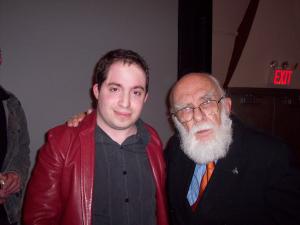I’ve written a lot about what has commonly been called the “New Atheism vs. Accommodationism” debate. The skeptical movement equivalent seems to be the “Don’t be a dick” debate, named after a talk Phil Plait delivered at The Amazing Meeting last year.
Well, Daniel Loxton has posted an article tracking the history of one side of that debate, which has stirred a big comment debate over at Skepticblog. The article as well as the comments have inspired me to once again jump into the discussion.
So here are my thoughts on the matter.
I’m really finding this debate rather tedious and unproductive at this point. Every movement seems to develop this dichotomy over civility vs. firebrandism. Both sides here have thoroughly laid out their positions and both sides feel their position is being straw-manned by the other. They talk past each other and no one seems to be particularly persuaded by the other side.
I see clear benefits to both sides operating simultaneously, particularly if they can play nice with each other and not go out of their way to publicly attack the other side, forcing a public response from that side. I think we all agree the key audience we’re trying to reach are the fence-sitters, and it’s quite clear that different fence-sitters respond to different approaches. Some audiences will respond to politeness while others will see it as disingenuous and be turned off. Meanwhile, some will respond to ridicule and flippancy within the framework of a precise and careful rebuttal. Something tells me Bill O’Reilly and Glenn Beck aren’t persuasive because of their amazing ability to keep a civil, un-dismissive tone. Some audiences will just respond better to blunt, unapologetic refutations, especially if they’re built on solid arguments, while others won’t.
I think those who sit squarely on one side or the other and aren’t willing to adapt their approach based on the particular situation they’re in need to wake up and realize that there is no one magic bullet that explains all of human psychology. The available data, as little as there is, seems to show that both methods have worked in the past, so I see no reason why anyone can maintain the view that either is completely ineffective.
There’s also a wide range being ignored by this dick/not a dick false dichotomy. As someone said in the comments section: “Currently, skepticism as a movement is full of firebrands but has no noteworthy public ‘dicks.’ The closest would be Penn Jillette, primarily because his chosen medium (TV show) doesn’t allow for a rigorous discussion of proof.” The term “dick” demands clarification. It can’t reasonably be applied to just any use of confrontational or deliberately provocative approaches.
Will some people refuse to acknowledge diversity among skeptics and try to paint everyone as “angry atheists”? Probably. But they’ll do that anyway and the idea that everyone must constantly conform to one particular model in order to trick people into thinking there is no diversity among skeptics and that we’re all equally civil is absurd. Every important social movement has faced such stereotyping and they managed to survive it, so I don’t really worry about it. It’s very hard to maintain such a stereotype when there are skeptics and atheists getting news for their charitable works. Nobody has to be saddled with the Hitchens/Myers reputation if they don’t want to be. It’ll be okay.





 Posted by Michael Rosch
Posted by Michael Rosch 








